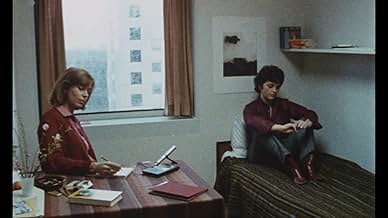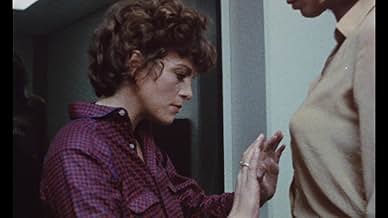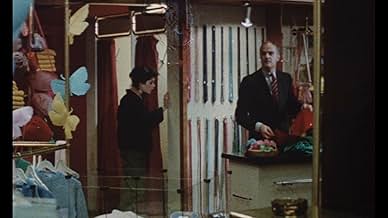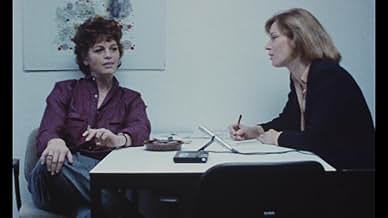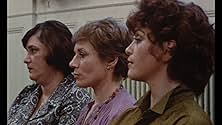IMDb RATING
6.7/10
1.3K
YOUR RATING
Three women of no previous acquaintance suddenly kill a male shopkeeper in the middle of the day. The female psychiatrist assigned to the case sets out to understand why.Three women of no previous acquaintance suddenly kill a male shopkeeper in the middle of the day. The female psychiatrist assigned to the case sets out to understand why.Three women of no previous acquaintance suddenly kill a male shopkeeper in the middle of the day. The female psychiatrist assigned to the case sets out to understand why.
- Awards
- 3 wins & 2 nominations total
Eddie Brugman
- Echtgenoot
- (as Eddy Brugman)
- Director
- Writer
- All cast & crew
- Production, box office & more at IMDbPro
Featured reviews
I'm not even sure if a DVD is available in North America, and if it isn't it would be a tremendous shame. "A Question of Silence" is a tough, rigorous, unsentimental and unblinking examination of justice and is, as another comment observed, a far less mainstream and safe film than Goriss's "Antonia's Line."
For anyone who has even a passing interest in dark, uncompromising work, go out of your way to find this film. It's a little wonky technically and there are perhaps 5 minutes or so of didactic twaddle one wishes the director has discarded in the cutting room- but none of this diminishes from the towering overall achievement.
For anyone whose taste runs to the safe and predictable and who doesn't like being provoked by the films they watch, avoid this one. It's not for you.
For anyone who has even a passing interest in dark, uncompromising work, go out of your way to find this film. It's a little wonky technically and there are perhaps 5 minutes or so of didactic twaddle one wishes the director has discarded in the cutting room- but none of this diminishes from the towering overall achievement.
For anyone whose taste runs to the safe and predictable and who doesn't like being provoked by the films they watch, avoid this one. It's not for you.
Reminiscent of the play/short story/film, A Jury of her Peers, written by Susan Gaskel-a contemporary of Eugene O'Neill's who was way more popular than O'Neill at the time, much to O'Neill's dismay.
To call this movie hate literature is one thing, but the analogy used referencing Jews and Nazis is completely not applicable here. This is a film about power, domination, and oppression, all three of which men exercise over women in our society. One would have to live in a bubble to say that Jews hold the same position over non-Jews or Nazis (or did pre-WWII)! As a Jew, I find your comment mildly offensive, and as a man (while it is always difficult to recognize one's privilege), I find this film to be an amazing critique of patriarchy. While murder may not be the solution, this film shows the extraordinary way in which 3 women who have been beaten down their whole lives (and have nothing to lose) attempt to fight back against an enemy that is unbeatable. The laughter at the end of this film proves just who gets it and who doesn't. PS- I've heard that in some places during the initial screenings of this film, women in the theaters actually broke out in laughter with the women on screen during the court scene....
After watching this film, I was forced to come search for what others had taken from it. I was shocked and jarred, however, at the heteroglossia present. SM-4 from Alabama wrote that, "Everyone assumes they must be insane, because to admit otherwise is to admit that the world is a very bad place for women, indeed." While it may be possible to interpret the film in this way and it may even be the intended interpretation, it strikes me as disingenuous. Though the court and justice system's appearing inability to imagine these women as competent is a form of sexism, it does not point to a "world (that) is a very bad place for women." Indeed, three white men not too long ago in America might have met in a store with a black man and beat him to death. According to SM-4's logic, the world would be a very bad place for white men also.
Just because one racial group, religious group, or gender strikes out at those whom they feel oppressed, threatened, or harmed by, that does not prove that those feeling of oppression, injury, or injustice are valid. In some cases, mitigating evidence may exist. In A Question of Silence, however, I found none.
Just because one racial group, religious group, or gender strikes out at those whom they feel oppressed, threatened, or harmed by, that does not prove that those feeling of oppression, injury, or injustice are valid. In some cases, mitigating evidence may exist. In A Question of Silence, however, I found none.
This film is NOT anti-male. It is not suggesting that women go out and randomly kill men just for being of that gender. What is does do is use a wonderful technique called reversal. If three men had brutalized a woman, well, "society" might not find that so shocking (maybe more now than earlier years, but certainly not as shocking as the reverse). It doesn't want to start propaganda, it wants to make you THINK. By making the therapist think on it, it forces the viewer to think on it as well. What's the history of women being brutalized and then remaining quiet about it? Have women really achieved the social, political, and economic equality that is the feminist goal? Why not? This movie doesn't hate men; it simply loves women enough to give everyone something to think about.
Did you know
- TriviaThe first plant that Nelly Frijda throws during her tantrum can be seen hitting the lens of the camera.
- How long is A Question of Silence?Powered by Alexa
Details
- Release date
- Country of origin
- Languages
- Also known as
- Die Stille um Christine M.
- Production company
- See more company credits at IMDbPro
Box office
- Budget
- NLG 300,000 (estimated)
Contribute to this page
Suggest an edit or add missing content

